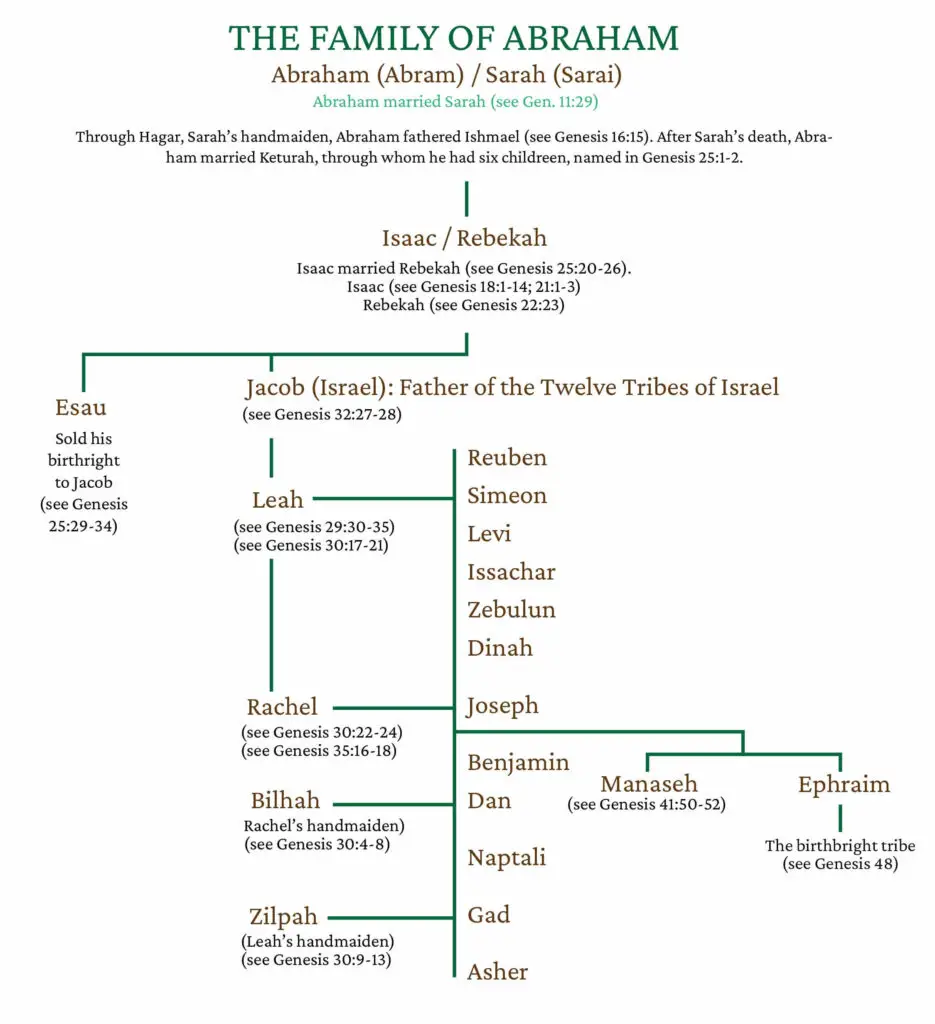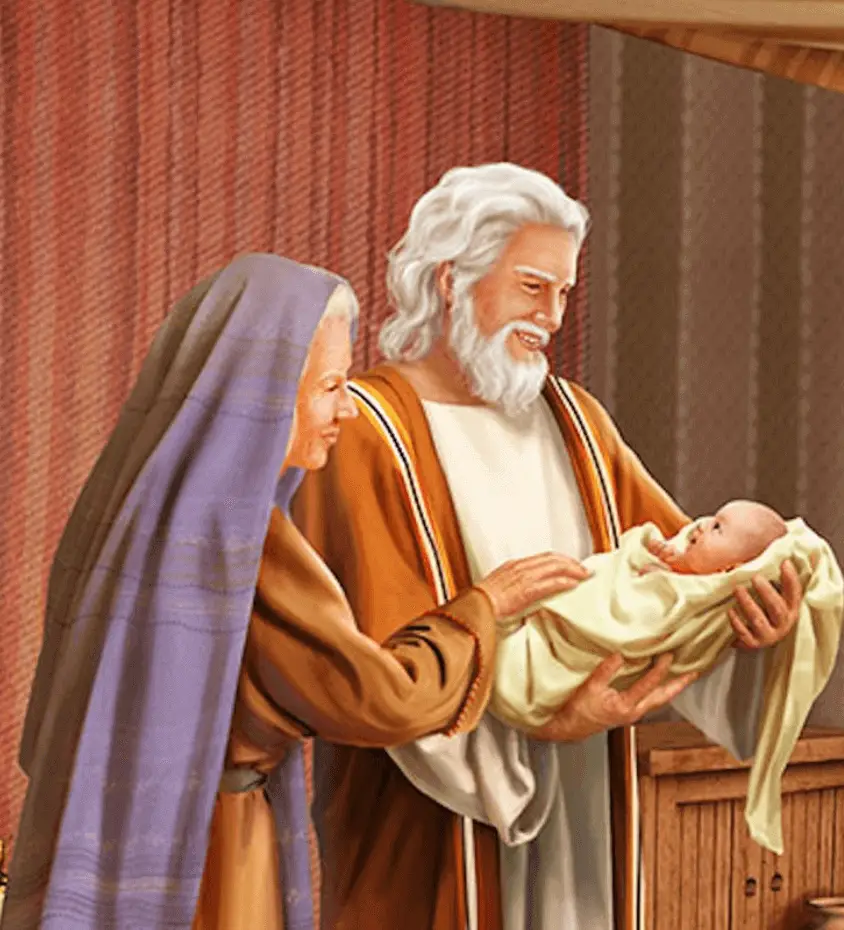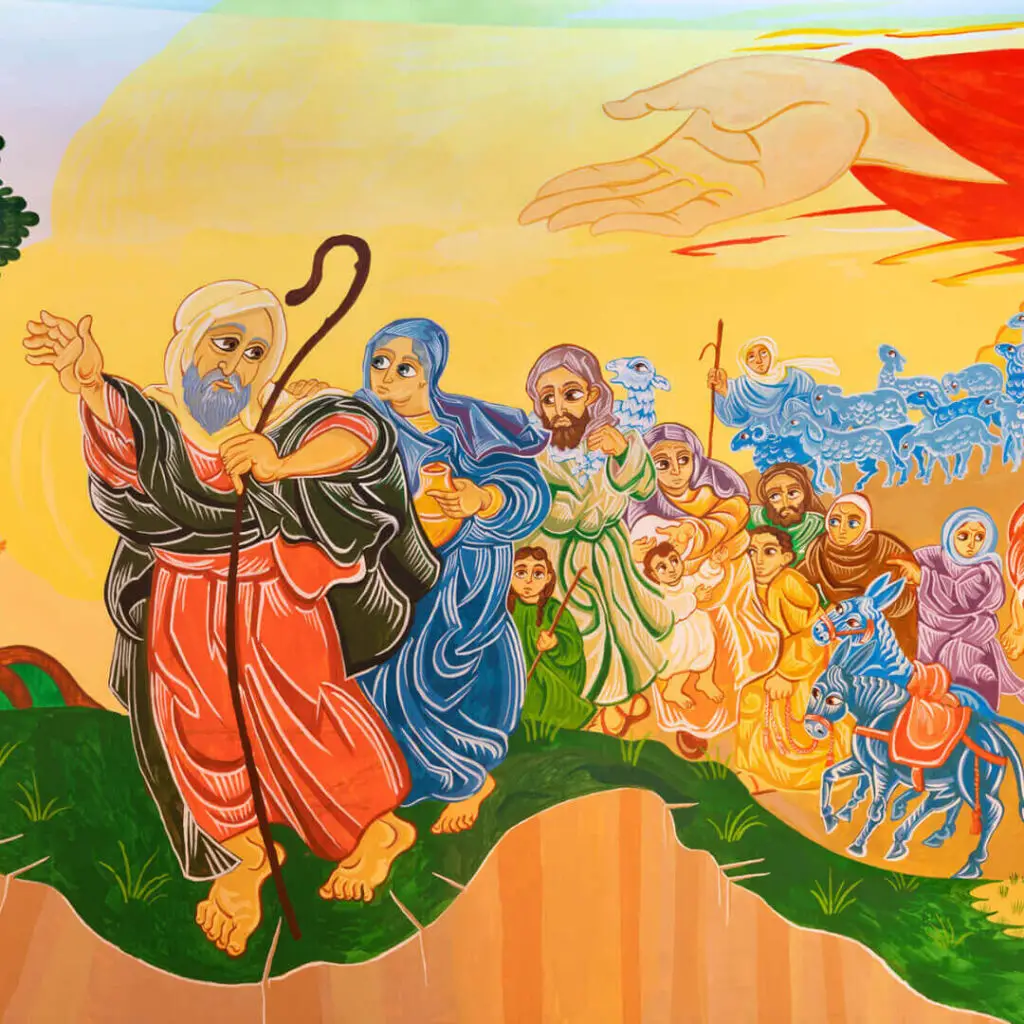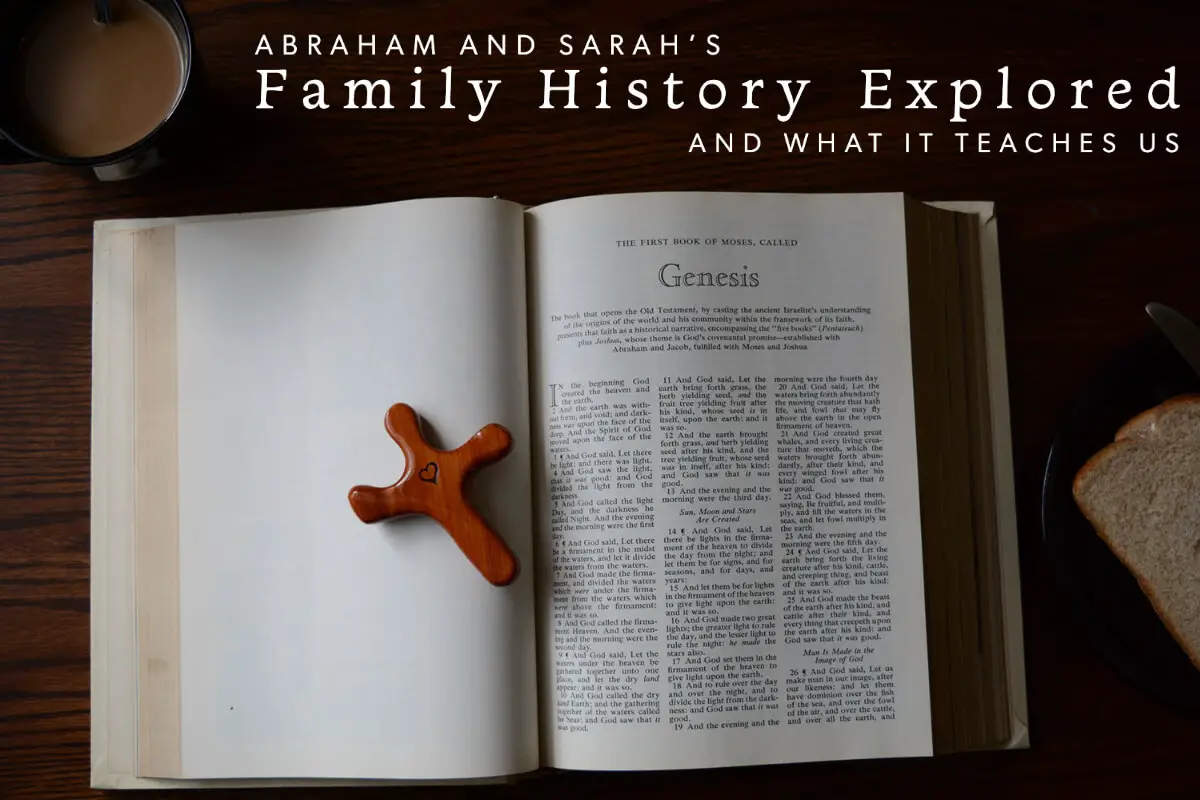When you study the Bible, one of the stories that continue to be very important is the story of Abraham, Sarah, and their family. Since the first book in the Old Testament, we learn about Abraham and Sarah and their family.
Abraham and Sarah were the parents of Issac. Their family tree and story are considered one of the most critical stories in the Old Testament. For many religions worldwide, the story of this family is considered one of the most critical and significant stories.
Table of Contents
- Abraham And Sarah’s Family Tree
- Issac And Rebekkah
- Jacob – Rachel And Leah
- What Is A Handmaiden?
- The Story Of Abraham And Sarah Teaches Us About Family History
- Frequently Asked Questions
- Related Questions
Abraham And Sarah’s Family Tree

The story of Abraham and Sarah is one of the most famous stories in the Bible, and their family tree is an integral part of that story. Abraham and Sarah’s story begins in the book of Genesis.
They were initially called Abram and Sarai, but God changed their names to Abraham and Sarah when he made a covenant with them. Abraham was promised that he would be the father of many nations and that his descendants would be as numerous as the stars in the sky.
Sarah, who had been barren all her life, was miraculously able to conceive and give birth to Isaac when she was 90. Abraham and Sarah had a long and eventful life, but the most significant event was the birth of their son Isaac, who would first marry Leah and then finally be able to marry Rebekah.
Abraham And Hagar And Their Son Ishmael
Sarah was quite old and thought she could not conceive children, so Sarah had Abraham marry her handmaiden Ishmael. Abraham and Hagar had a son named Ishmael.
But once Sarah conceived and had Issac, Isaac became the sole heir. Hagar and Ishmael were sent away from Abraham’s household.
The Lord had promised Abraham and Hagar that Ishmael would become a father of a great nation, but the covenant was to come through Issac and not Ishmael.
Because Hagar and Ishmael were sent from Abraham’s household, they lived in the wilderness and knew that Ishmael had become a great archer.
We also learn that even though they were expelled from the household, they were not forgotten. When Abraham died, both Ishmael and Issac buried their father together.
In Genesis 17:20, we learn:
“And as for Ishmael, I have heard thee: Behold, I have blessed him, and will make him fruitful, and will multiply him exceedingly; twelve princes shall he beget, and I will make him a great nation.”
King James Version Bible – Genesis 17:20
We also know that Ishmael had twelves sons whose names were:
- Nabajoth
- Kedar
- Adbeel
- Mibsam
- Mishma
- Dumah
- Massa,
- Hadar
- Tema
- Jetur
- NaphishKedemah
We know from the book of Genesis that these sons were referred to as twelve princes. So even if Ishmael was kicked out of Abraham’s household, it seems he was not forgotten and became a father of a great nation.
We also learn from the book of Genesis that Ishmael’s daughter Mahalath married Esau. So we know that besides these twelve sons or princes that Ishmael had, he also had at least one daughter.
Overall, the concept of a handmaiden becoming an heir to her mistress is complex and multifaceted, with different implications in different contexts. However, it serves as a reminder of women’s vital role in the history of God’s chosen people, both as wives and mothers and as valued household members.
Abraham And Keturah
But Abraham and Sarah’s family tree does not end there. After Sarah’s death, Abraham married Keturah and had six more children, who became the fathers of various tribes and nations.
The sons of Keturah and Abraham included:
- Zimran
- Jokshan
- Medan
- Midian
- Ishbak
- Shuah
As we can see, Abraham had many children, especially sons. He also had many grandchildren.
Abraham’s life was full of trials and tribulations, but he remained faithful to God throughout his long journey. His descendants, through Isaac and Jacob, would become God’s chosen people and fulfill the promise made to Abraham so many years before.
The story of Abraham and Sarah’s family tree is a testament to the faithfulness of God and the power of his promises.
Issac And Rebekkah
Isaac grew up and married Rebekkah, and they had two sons, Esau and Jacob. Esau was the firstborn, but he sold his birthright to Jacob for a bowl of stew. Esau also married Ishmael’s daughter – we can assume she is much younger.
Later, Jacob deceives his father, Isaac, and receives the blessing for Esau. This caused a rift between Jacob and Esau, and Jacob had to flee to his uncle Laban’s house.
Jacob – Rachel And Leah
While living with Laban, Jacob fell in love with Rachel, one of Laban’s daughters. Laban agrees to give Jacob Rachel’s hand in marriage, but he first tricks Jacob into marrying Rachel’s older sister, Leah.
Jacob eventually married Rachel, and he had 12 sons with his four wives: Leah, Rachel, and their handmaids, Bilhah and Zilpah.
These 12 sons became the patriarchs of the 12 tribes of Israel. The twelve tribes of Israel, or Jacob’s twelve sons, are as follows:
Jacob And Leah’s Sons:
Jacob and Leah had the most sons together – seven out of Jacob’s twelve sons. His seven sons he had with Leah were:
- Reuben
- Simeon
- Levi
- Judah
- Issachar
- Zebulun
- Dinah
Jacob And Rachel’s Sons
Jacob and Rachel only had two sons. We do not know if they had many daughters. But their two sons are:
- Joseph
- Benjamin
From Joseph comes the lineage of Manasseh and Ephraim.
Jacob And Bilhah
Bilhah was Rachel’s handmaiden.
Jacob and Bilhah had two sons who are:
- Dan
- Naphtali
What Is A Handmaiden?
The concept of a handmaiden being an heir to her mistress is exciting and complex, as it is discussed in the Bible in several different contexts.
Proverbs 30: 23 states this about the handmaiden and her role in the household:
“For an odious woman when she is married; and an handmaid that is heir to her mistress.”
King James Version Bible – Proverbs 30:23

In the story of Abraham and Sarah, we see how Sarah’s handmaiden, Hagar, became an heir to her mistress through her son Ishmael.
According to the book of Genesis, Sarah could not have children, so she gave her handmaiden Hagar to her husband Abraham as a concubine. Hagar became pregnant and gave birth to Ishmael, considered the heir to Abraham’s household.
However, when Sarah miraculously became pregnant and gave birth to Isaac, she demanded that Abraham cast Hagar and Ishmael out of their household.
Despite this rejection, God promised Hagar that her son Ishmael would become the father of a great nation. This promise was fulfilled as Ishmael became the father of 12 princes and the progenitor of the Ishmaelites.
In this way, Hagar and her son Ishmael became heirs to Abraham’s household and part of the lineage of God’s chosen people. The fact that Ishmael had twelve princes and became a father of a great nation shows that Lord saw Hagar and Ishmael as part of Abraham’s household, even if they were kicked out of the household.
The concept of a handmaiden becoming an heir to her mistress is also discussed in the laws of inheritance in the Book of Numbers. These laws state that if a man dies without sons, his inheritance should be passed to his daughters. However, his inheritance should pass to his brothers if he has no daughters. If he has no brothers, it should pass to his father’s brothers. And if there are no male relatives, it should pass to his nearest female relative.
This last provision is significant, as it allows a daughter or other female relative to inherit property and wealth if no male heirs are available. In this way, a handmaiden or other female servant could become an heir to her mistress if there were no other living male relatives.
It also shows us that a handmaiden was not a mistress. She was, in fact, an essential part of the household and was so highly valued during this time in the Bible that she could become an heir for her mistress.
Overall, the concept of a handmaiden becoming an heir to her mistress is complex and multifaceted, with different implications in different contexts. However, it serves as a reminder of women’s vital role in the history of God’s chosen people, both as wives and mothers and as valued household members.
The Story Of Abraham And Sarah Teaches Us About Family History

Family history and genealogy have been important since the beginning of the Bible, as evidenced by the many genealogies recorded on its pages. These genealogies serve as a way of tracing the lineage of significant figures and tracing the history of God’s chosen people. They also help to connect individuals to their past and give them a sense of identity and belonging.
The story of Abraham and Sarah is a prime example of the importance of family history and genealogy. God chose Abraham to be the father of a great nation, and his descendants would become the people of Israel.
This lineage was passed down through his son Isaac and his grandson Jacob, who became the father of the 12 tribes of Israel. Without these genealogies, tracing the lineage of Jesus, a descendant of Abraham, Isaac, and Jacob, would be difficult.
Furthermore, the story of Abraham and Sarah shows how important it is to keep records of one’s family history. Genesis 25:12, it is recorded that after Sarah’s death, Abraham married Keturah and had six more children.
These children became the fathers of various tribes and nations, and their descendants played important roles throughout the Old Testament. Without records of these children, their contributions to the history of God’s people might have been lost.
In today’s world, family history and genealogy are still crucial for many people. They help to connect individuals to their past and give them a sense of their place in the world.
They also provide a way to honor the memory of ancestors and preserve their legacy for future generations. The story of Abraham and Sarah reminds us of the importance of our family histories. It encourages us to learn more about our ancestors and their contributions to our lives.
The Hummel Family is a website all about Family History research. We focus on Swedish, German, English, Scottish, and American Genealogy. We also discussed Asia and China, as we had ancestors who spent many years in China.
You are welcome to join us and become part of our community by signing up for our FREE newsletter, The Hummel Family; sign up by clicking here.
Check out our Youtube Channel, Family History Buzz, by clicking here.
Frequently Asked Questions
Who were Abraham and Sarah in the Bible, and why are they important?
Abraham and Sarah were key figures in the Old Testament. Abraham, originally Abram, is considered the father of many nations and a foundational figure in Judaism, Christianity, and Islam. Sarah, his wife, was known for her beauty and her role in the fulfillment of God’s promise.
What is the significance of Abraham and Sarah’s family tree in biblical history?
Their family tree is significant because it traces the lineage through which the promised Messiah, Jesus Christ, would eventually come. It establishes a link between God’s covenant with Abraham and the fulfillment of that covenant through subsequent generations.
What important promises did God make to Abraham and Sarah?
God promised Abraham that he would become the father of a great nation, that his descendants would be numerous, and that they would inherit the land of Canaan. God’s promise also included blessing all nations through Abraham’s offspring.
Why did Abraham and Sarah face challenges in starting a family?
Sarah was barren and unable to conceive, which posed a challenge to God’s promise of descendants. In their eagerness to fulfill God’s promise, they even considered unconventional methods like Sarah giving her maidservant Hagar to Abraham, resulting in the birth of Ishmael.
What is the significance of Isaac’s birth in Abraham and Sarah’s story?
Isaac’s birth was a miracle, as Sarah conceived in her old age. His name means “laughter,” signifying the joy and amazement of his parents. Isaac is a symbol of God’s faithfulness and His ability to bring about the impossible.
Why did God ask Abraham to sacrifice Isaac?
God’s command to sacrifice Isaac was a test of Abraham’s faith and obedience. It revealed Abraham’s willingness to obey even in the face of extreme difficulty. The story highlights the concept of faith and obedience in the face of trials.
How does the story of Abraham and Sarah’s family teach us about trust in God’s timing?
The story teaches us that God’s promises may not always be fulfilled immediately, and His timing is perfect. Abraham and Sarah had to wait for many years before Isaac’s birth, teaching us patience and trust in God’s plan.
What lessons can we learn from Sarah’s doubt and laughter when told about Isaac’s birth?
Sarah initially laughed in disbelief when told she would bear a child in her old age. This teaches us the importance of trusting God’s promises even when they seem impossible. It also shows that God’s plans often surpass our expectations.
Related Questions
Why Did Matthew Start His Gospel With The Ancestors Of Jesus?
Matthew started his gospel with the ancestors of Jesus as he wanted to show the Jews that the Messiah had come as had been prophesied. He also wanted to show Jesus fulfilled the prophecy that the Messiah was a son of David.
You can discover more by reading Why Did Matthew Start His Gospel With The Ancestors Of Jesus? by clicking here.
The First Book Of The Old Testament Is Genesis
Genesis remains an essential book in the Old Testament and Bible because it is where we discover the world’s creation and learn about Adam and Eve. We also find other great prophets such as Noah, Abraham, and Joseph. Anyone reading the Bible should start with the book of Genesis – the very first book of the Old Testament.
You can learn more by reading The First Book Of The Old Testament Is Genesis by clicking here.
